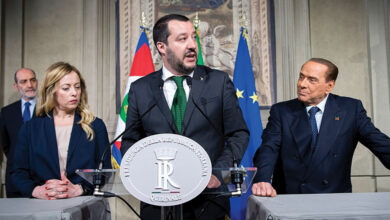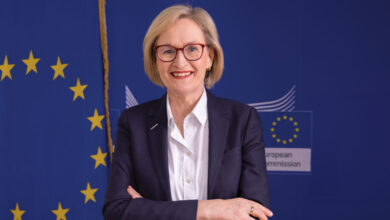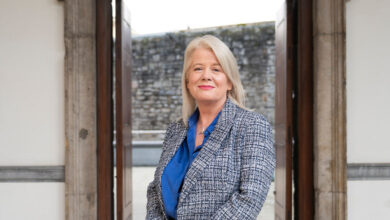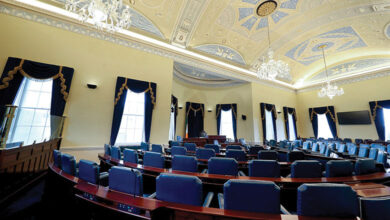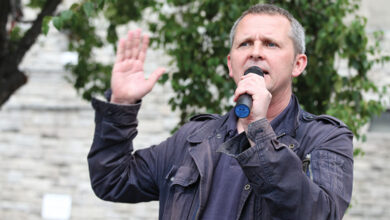Mol an óige James O’Connor TD
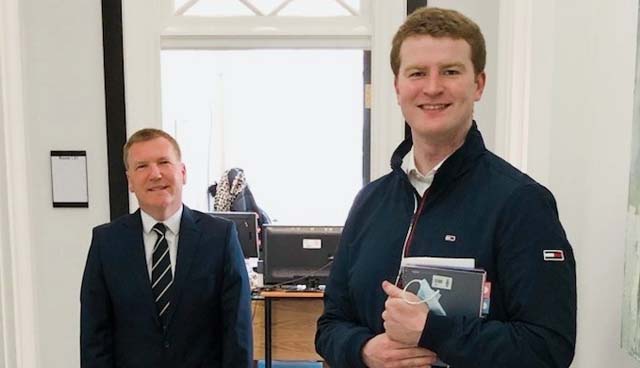
Ciarán Galway sits down with Fianna Fáil TD for Cork East, and youngest member of the Dáil, James O’Connor, to discuss party direction, current priorities, and ambitions for the future.
As might be expected, O’Connor’s fascination with Irish politics began at a young age. Evidencing this, he recounts his ability to name the entire cabinet at the age of 11 years old. However, growing up on a small farm, his family life was entirely apolitical. Now, aged just 24, the Cork native is the youngest TD in the 33rd Dáil.
Having previously undertaken a transition year internship with Micheál Martin TD, O’Connor then embarked upon a now deferred business, economics, and social studies course at Trinity College Dublin, where he was elected to Student’s Union in his first year. From there, he began an internship in the office of Jim O’Callaghan TD before, curiously, taking on a role with Mary Mitchell O’Connor, then a Fine Gael super junior minister.
“The amount of patronising bullies you meet, if you were to stand in my shoes — in all walks of life, both inside the political system and outside — is gobsmacking.”
In 2019, he seized an opportunity to represent the Midleton-Youghal local electoral area as a member of Cork County Council, deferring the completion of his degree at Trinity. Acknowledging that “I was lucky that there was an opportunity there”, he then actively lobbied to be added to the Fianna Fáil ticket for the general election, making phone calls to party leader Micheál Martin and general secretary Seán Dorgan.
In February 2020, at the age of 22, he claimed a seat in Dáil Éireann becoming the third youngest ever Fianna Fáil TD, behind Mary Coughlan and Lorcan Allen. In 2022, he is one of only two TDs under the age of 30.
Ideology
Reflecting on his decision to join Fianna Fáil as a 16-year-old and to stick with the party, he emphasises that family tradition had no bearing. Rather, it was informed by his interactions with people like O’Callaghan, who he regards as “an exceptionally honourable individual… who I look up to still”.
“I like Fianna Fáil historically because there is a degree of interventionism. I think that is very important because if you leave the Civil Service to its own agenda, free market economics and all that, I think it does genuinely cause issues in a country the size of Ireland,” he observes.
“Local government does not function properly in this country. A lot of semi-state agencies maybe do not function properly. I think interventionism on that point is very important for democratically elected politicians who the public sent here to do a job. That is something I often land myself in a degree of bother with, perhaps with cabinet colleagues of mine, but I feel very strongly about that.”
Fianna Fáil
“There is an expectation in rural constituencies that the TD needs to be physically seen to be determined to be working.”
Given the noted rivalry between Micheál Martin and Jim O’Callaghan, alongside O’Connor’s tutelage under both colleagues, the coming year could test his loyalties. Diplomatically, he describes them as “remarkably dedicated individuals”.
Specifically referencing his party leader “in terms of the sacrifices he has made”, he insists: “It has to be admired and it is important the man is given the respect that he does deserve. Often, he does not get it within the political system or outside it.” Simultaneously, he regards O’Callaghan as “a gifted individual when it comes to understanding the importance of legislation, the scrutiny of legislation”.
Discussing the ongoing battle for the soul of Fianna Fáil then, the first-time TD believes that this can be overstated. Reflecting on his party’s lineage as a “populist, popular party”, he asserts: “Yes, we made mistakes, but all in all, Ireland is one of the top five countries in the world to live in and that is in no short part due to the work of many of our predecessors.”
Challenges
In the context of public frustration in relation to the housing crisis, healthcare, and the cost of living, O’Connor regards the rise of Sinn Féin, “in terms of being wiped out at the local elections and coming back and getting the largest proportion of votes in the country” as “something that should alarm Fianna Fáil”.
“I think we are going through a destabilising cycle of politics at the moment, and we just need to weather the storm and focus on what matters, which is people’s livelihoods, their incomes, the security of having a home, of having a stable job – a circumstance where you can raise a family and still have enough money to live. The bread and butter of making sure you have a functional economy and a strong, robust, and fair republic.”
Determining housing to be the single biggest challenge facing Fianna Fáil in government, O’Connor predicts that “housing is and will remain the single biggest domestic issue in this country over the course of the next five to six years”.
Outlining that the Government’s resources have been preoccupied with Covid up until this point, he suggests that attentions must now turn to housing. Discussing the housing challenge that prevails in Cork East, he adds: “I would like to see the Government introduce constitutional change to deal with landbanks and vacant sites.”
Youth involvement
While having taken a more independent route, O’Connor recognises the role that youth organisations play in channelling young people into electoral politics. Two key experiences he identifies as being gained from party youth organisations are firstly, a sense of internal organisation and secondly, development of an ability to articulate and debate ideas. “For some it is a cornerstone of growth and development. Micheál Martin, for example, was very heavily involved in Ógra,” he says.
There are some practical reasons why it is so difficult for young people to get involved in politics
Aside from navigating local party structures, the single biggest challenge O’Connor faced in getting elected was “a lot of dismissive people”. “I have a job to do, and I take it really seriously,” he notes, adding: “We all have our setbacks, we all have our good days, but all-in-all, I think there are officials, political individuals that look upon you as a child and disregard that you have an electoral mandate to do the job that you are in.”
Remarking on the importance of facing down this attitude, he emphasises that unlike a career in financial services or law, the work of a TD is more autonomous. “We are independent thinking individuals who manage our own set up. We have staff working underneath in terms of a management structure and we are fighting battles on every corner. It is difficult to tempt someone away from a career in the private sector or the Civil Service, leaving a stable job and coming under the scrutiny of the national media.”
Internal strife
Indeed, the young Cork TD’s willingness to challenge senior colleagues is not in question. Most famously, in October 2021, O’Connor dramatically threatened to resign from the Fianna Fáil parliamentary party if the Castlemartyr and Killeagh bypass project was not included in the new iteration of the National Development Plan.
Outlining his rationale, he explains: “I had been in a situation where I had spent two-and-a-half years working to get a firm commitment from government about getting road projects advanced in my own area. Youghal needs better road connectivity to the Port of Cork, Cork Airport, and Cork city, which is the main hub of investment and employment, in order to lift the town’s economic circumstances and make it more attractive for people to invest in, eventually getting some IDA investment into the area, which we do not have at the moment.
“I was very bitterly disappointed about what had happened in the NDP. I have to say, it was probably one of the worst couple of weeks of my life. I was wrecked from the stress of it. At least I got my experience of what it is like to get my fingers burnt early, which does no harm in your growth and development in politics.
“I am happy I stood up for myself and it went down well where it needed to: in my constituency. There is no questioning the fact that I think it has done damage to my standing with government colleagues, but sure look, at the end of the day, they are not going for election in my constituency, I am.”
Arguing that his brinkmanship was as more than parochial, he emphasises that the bypass in question is on a national route. “It is the main road route between Rosslare and Cork. There are hundreds of millions of euro, if not billions, of goods travelling that route. What we had was a situation whereby approximately 30,000 people were being directly impacted in a large area, day on day, trying to get school and work. This is not just a small area of the constituency, this is about a region; Waterford, Wexford, and Cork. When it is done, it will pay back for itself multiple times because of the impact it will have on the efficiency of the economy.
“At the time, what bothered me greatly, and this is more important to me than the rest of it, I had sat down in rooms with people and got commitments which were not honoured. That is what hit me more than the issue of whether it was considered to be parochial politics or not.”
Learning curve
Amid the Covid-19 pandemic, O’Connor found himself hindered in his move from Cork County Council to the Dáil. “It has been devastating because it limits the amount of exposure you can get with people. That is a very important part of being a first time TD. We have yet to see what the electoral outcome of that will be.
“While I have been working very hard in an office, a lot of people do not see that and that is something that is a concern. There is an expectation in rural constituencies that the TD needs to be physically seen to be seen to be determined to be working,” he concedes.
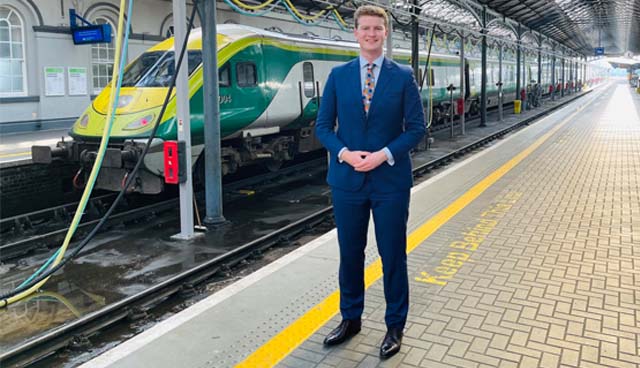
Significance
Motivated by a desire to prove his competence, O’Connor places some significance on his status as the youngest TD. “The amount of patronising bullies you meet, if you were to stand in my shoes – in all walks of life, both inside the political system and outside – is gobsmacking.
“Out of sheer determination, I want to prove everybody wrong. I think I have done that so far and I will continue to do so. It comes back to that issue that we have not got enough young people in politics; many of them are leaving and we are getting the wrong demographic into politics at the wrong stages of their lives.
Young voices in the Dáil
With one of the youngest populations of any developed country in the world, the Cork TD suggests that the dearth of representation among people under the age of 30 in the Dáil is “appalling”.
“Often, we hear about the gender divide and that is important, but the age divide is even more staggering. Again, it comes back to nature of politics, a lot of people perceive politics as a situation that is so unstable as a career that you need to have your family setup and dynamic right to begin with. There are some practical reasons why it is so difficult for young people to get involved in politics. That is something that merits a bit of attention,” he says.
“For instance, when you are elected to the Dáil you are categorised as a politically exposed person by European legislation. Unfortunately, what that means is that if you are someone like me, you cannot get a mortgage so cannot buy your own home.”
Personal ambitions
Outlining his belief that the current Government must stay the course and complete its five-year term, O’Connor projects that the next 12 months “are shaping up to be a cracker politically… I am buckling up for a bumpy ride”.
In this context, his personal ambition for the future is simply to achieve re-election at the next general election. “I am not looking at ministerial positions. I think it clouds people’s judgement when they start doing that and they get overly ambitious too quick. The story of Icarus is a very good one and one I think of often.
“I have a lot to learn. I have been in politics for six years between the internal [element], council, and now the Dáil. I still have maybe 50 per cent more to learn in terms of how things work around here; how the interpersonal relationships work.
“If it goes to a general election for whatever reason, we are not going to have anything done on time… the public will not be very forgiving,” he adds, concluding: “I am interested ensuring that before I go back to the doors ahead of the next general election, that I can look people honestly in the face and say that I have done some good. I have at the moment, but I have more to do.”

